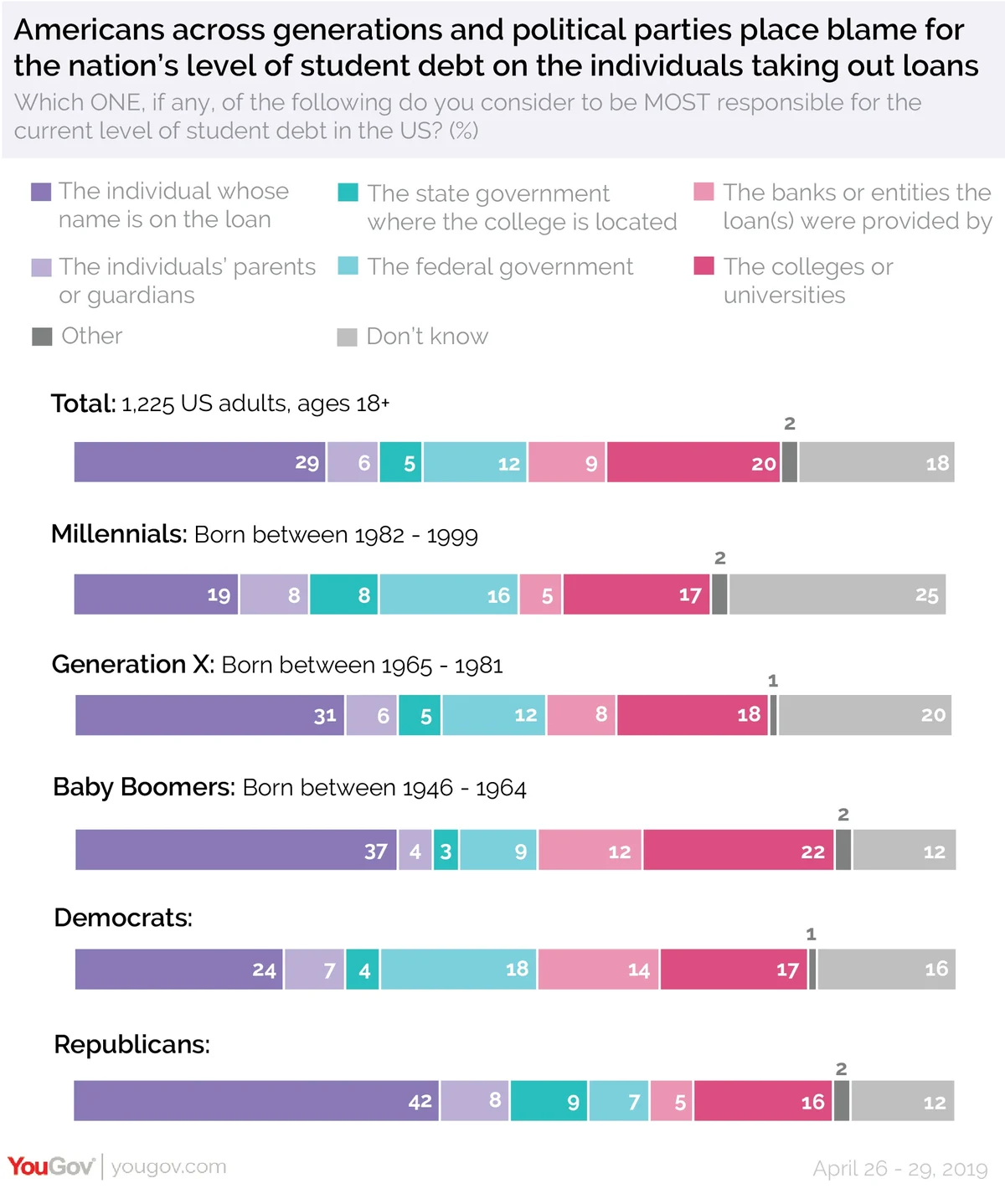Two-thirds of people say college is at least somewhat unaffordable, but most people still blame the individual for the current level of student loan debt in America
If you think that a college degree is unaffordable, you’re not alone. Most Americans (67%) agree that the price of college is steep. But that doesn’t mean Americans are sympathetic about your debt.
A new YouGov RealTime poll shows that nearly three in 10 Americans (29%) believe students borrowers bear the most responsibility for the current level of college debt in the United States. One in five (20%) blame the colleges and universities being attended by students with loans most, compare to 12% who most blame the federal government. Fewer than 10% place most responsibility on entities providing loans (9%), parents or guardians of loan-holders (6%), or state governments (5%).
These opinions could have big implications in the 2020 presidential election, especially for Democratic candidates who have added student loan forgiveness proposals to their platform.
America’s Student Debt Blame Game
Millennials aren’t sure who’s responsible for America’s student loan debt. When asked who’s most to blame, a quarter (25%) of Millennials selected “don’t know.” That uncertain response beat out the amount of responsibility Millennials place on the individual taking out the loan (19%), the college attended with the loan (17%), and the federal government (16%).
Among older generations, that blame shifts more definitively to the individual. Three in ten (31%) Gen Xers and 37% of baby boomers hold loan-signers responsible for the debts in their name.
More than four in ten (42%) Republicans agree that the individual is to blame, compared with nearly a quarter of Democrats (24%). Following the individual, Democrats are most likely to place responsibility on the federal government (18%) and universities (17%).

Which Student Loan Forgiveness Policies are Embraced
A few student loan forgiveness policies have been proposed on a national level, either by presidential candidates or members of Congress.
A policy proposal from Senator Bernie Sanders in his College For All plan to reduce student loan interest to 2006 rates (2.32%) with a guarantee that they will never rise above 8.25% is supported by a majority of Democrats (71%) and Republicans (63%).
The second part of Sanders’ proposal, which suggests eliminating undergraduate tuition and fees at four-year public universities through a federal tax on Wall Street stock trades, is less agreeable across the aisle. Nearly two-thirds (66%) of Democrats support the idea with one in ten (11%) opposing it. Among Republicans, three in ten (30%) support the proposal and more than four in ten (42%) oppose it.
Seven in ten (70%) Democrats support a tenet of the policy proposed by Senator Elizabeth Warren that would allow up to $50,000 of student loan debt being forgiven for every person with a household income of less than $100,000. A little more than one-third (36%) of Republicans support the policy and 36% also opposed it. About one in three (28%) Republicans were neutral on the proposal.
The second cornerstone of Warren’s student loan policy—a portion of student debt being forgiven for every person with a household income between $100,000 and $250,000 with higher income households getting less forgiveness—is supported by half (52%) of Democrats and one-third (34%) of Republicans. A little less than half of Republicans (45%) opposed the policy, compared to about a quarter (24%) of Democrats.
A majority (58%) of Democrats support all student loans being forgiven regardless of circumstance compared to about a quarter (27%) of Republicans. A majority of Republicans (53%) oppose that measure.
Despite Cost, College Education Remains the Status Quo
Half of Republicans (50%) say a college education is not worth high levels of student loan debt, compared to one-third (35%) of Democrats that agree.
Nearly seven in ten (68%) Republicans who attended would tell themselves to go to college again, a statement that 82% of Democrats echo. Only about one in five (20%) Americans who attended college would tell younger versions of themselves not to attend college.
See full poll results here. Learn more about YouGov RealTime and share your own opinion by signing up to be a panelist here.
Methodology: Total unweighted sample size was 1,225 US adults ages 18+. The responding sample is weighted to the profile of the sample definition to provide a representative reporting sample. Interviews were conducted online between April 26 - 29, 2019.
Image: Getty










